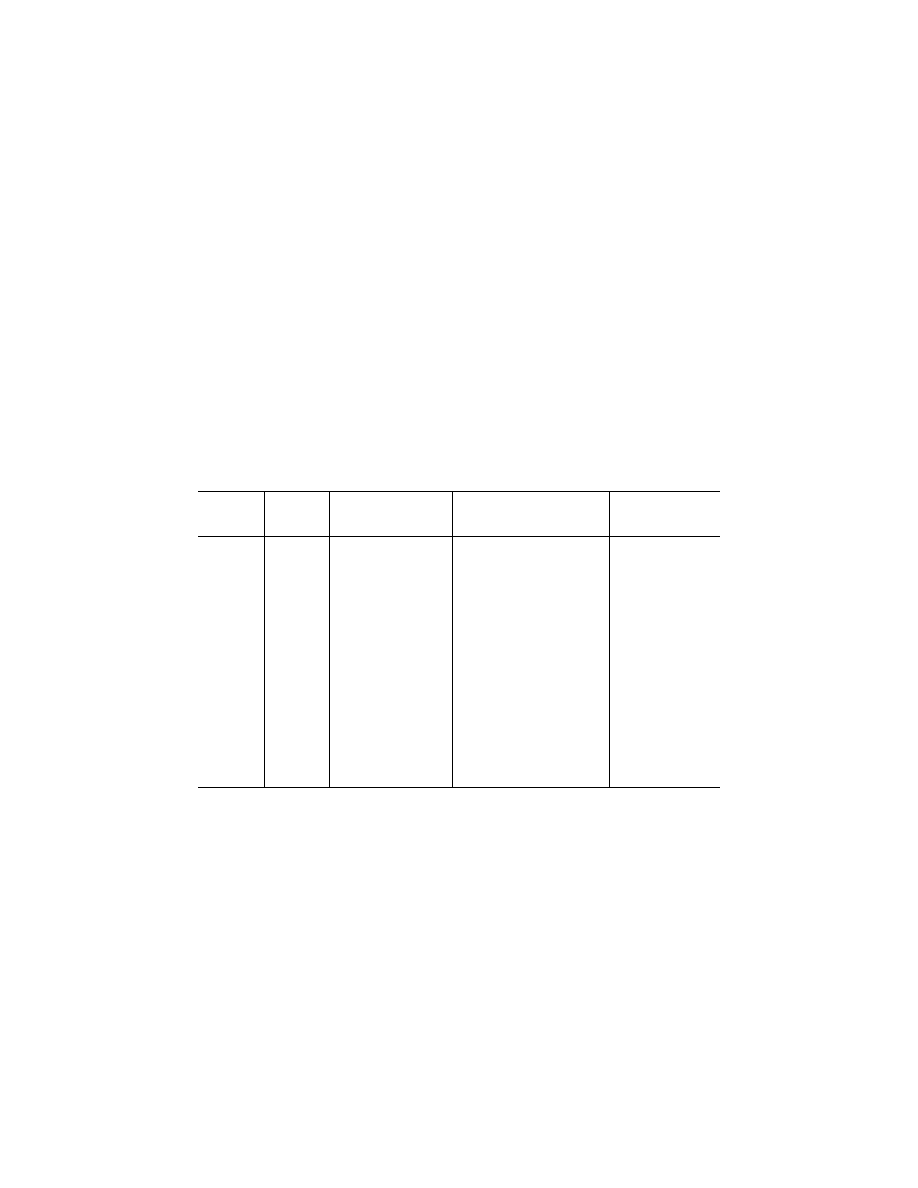
370
49 CFR Ch. I (10–1–18 Edition)
§ 172.102
transported in portable tanks are spec-
ified in tank instruction T75.
(ii) The following table specifies the
portable tank requirements applicable
to ‘‘T’’ Codes T1 through T22. Column 1
specifies the ‘‘T’’ Code. Column 2 speci-
fies the minimum test pressure, in bar
(1 bar = 14.5 psig), at which the periodic
hydrostatic testing required by § 180.605
of this subchapter must be conducted.
Column 3 specifies the section ref-
erence for minimum shell thickness or,
alternatively, the minimum shell
thickness value. Column 4 specifies the
applicability of § 178.275(g)(3) of this
subchapter for the pressure relief de-
vices. When the word ‘‘Normal’’ is indi-
cated, § 178.275(g)(3) of this subchapter
does not apply. Column 5 references ap-
plicable requirements for bottom open-
ings in part 178 of this subchapter.
‘‘Prohibited’’ means bottom openings
are prohibited, and ‘‘Prohibited for liq-
uids’’ means bottom openings are au-
thorized for solid material only. The
table follows:
T
ABLE OF
P
ORTABLE
T
ANK
T C
ODES
T1–T22
[Portable tank codes T1–T22 apply to liquid and solid hazardous materials of Classes 3 through 9 which are transported in
portable tanks.]
Portable tank
instruction
(1)
Minimum test
pressure
(bar)
(2)
Minimum shell thickness
(in mm-reference steel)
(
See
§ 178.274(d))
(3)
Pressure-relief requirements
(
See
§ 178.275(g))
(4)
Bottom opening
requirements
(
See
§ 178.275(d))
(5)
T1 ..................
1 .5 § 178.274(d)(2)
Normal ..............................................
§ 178.275(d)(2)
T2 ..................
1 .5 § 178.274(d)(2)
Normal ..............................................
§ 178.275(d)(3)
T3 ..................
2 .65 § 178.274(d)(2)
Normal ..............................................
§ 178.275(d)(2)
T4 ..................
2 .65 § 178.274(d)(2)
Normal ..............................................
§ 178.275(d)(3)
T5 ..................
2 .65 § 178.274(d)(2)
§ 178.275(g)(3) .................................
Prohibited
T6 ..................
4 § 178.274(d)(2)
Normal ..............................................
§ 178.275(d)(2)
T7 ..................
4 § 178.274(d)(2)
Normal ..............................................
§ 178.275(d)(3)
T8 ..................
4 § 178.274(d)(2)
Normal ..............................................
Prohibited
T9 ..................
4
6 mm
Normal ..............................................
Prohibited for liquids.
T10 ................
4 6
mm
§ 178.275(g)(3) .................................
Prohibited
T11 ................
6 § 178.274(d)(2)
Normal ..............................................
§ 178.275(d)(3)
T12 ................
6 § 178.274(d)(2)
§ 178.275(g)(3) .................................
§ 178.275(d)(3)
T13 ................
6 6
mm
Normal ..............................................
Prohibited
T14 ................
6 6
mm
§ 178.275(g)(3) .................................
Prohibited
T15 ................
10 § 178.274(d)(2)
Normal ..............................................
§ 178.275(d)(3)
T16 ................
10 § 178.274(d)(2)
§ 178.275(g)(3) .................................
§ 178.275(d)(3)
T17 ................
10 6
mm
Normal ..............................................
§ 178.275(d)(3)
T18 ................
10 6
mm
§ 178.275(g)(3) .................................
§ 178.275(d)(3)
T19 ................
10 6
mm
§ 178.275(g)(3) .................................
Prohibited
T20 ................
10 8
mm
§ 178.275(g)(3) .................................
Prohibited
T21 ................
10
10 mm
Normal ..............................................
Prohibited for liquids.
§ 178.275(d)(2).
T22 ................
10 10
mm
§ 178.275(g)(3) .................................
Prohibited
(iii) T50
When portable tank in-
struction T50 is indicated in Column (7)
of the § 172.101 Hazardous Materials
Table, the applicable liquefied com-
pressed gas and chemical under pres-
sure descriptions are authorized to be
transported in portable tanks in ac-
cordance with the requirements of
§ 173.313 of this subchapter.
(iv)
T75.
When portable tank instruc-
tion T75 is referenced in Column (7) of
the § 172.101 Table, the applicable re-
frigerated liquefied gases are author-
ized to be transported in portable
tanks in accordance with the require-
ments of § 178.277 of this subchapter.
(v)
UN and IM portable tank codes/spe-
cial provisions.
When a specific portable
tank instruction is specified by a ‘‘T’’
Code in Column (7) of the § 172.101 Table
for a specific hazardous material, a
specification portable tank conforming
to an alternative tank instruction may
be used if:
(A) The alternative portable tank has
a higher or equivalent test pressure
(for example, 4 bar when 2.65 bar is
specified);
(B) The alternative portable tank has
greater or equivalent wall thickness
(for example, 10 mm when 6 mm is
specified);
(C) The alternative portable tank has
a pressure relief device as specified in
VerDate Sep<11>2014
16:41 Oct 31, 2018
Jkt 244226
PO 00000
Frm 00380
Fmt 8010
Sfmt 8010
Q:\49\49V2.TXT
PC31